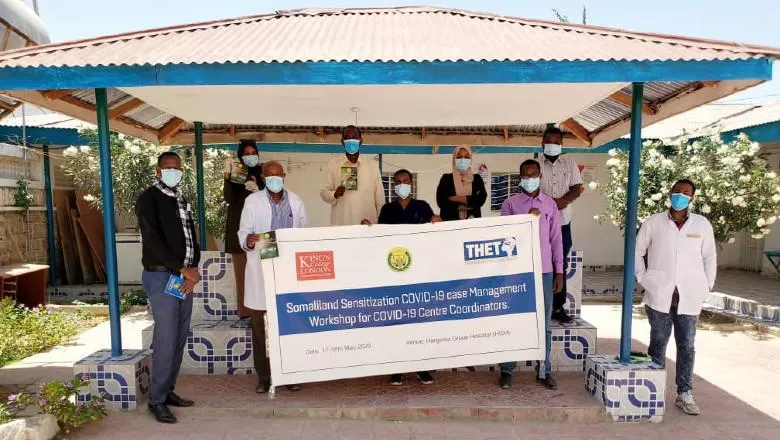We are so lucky to have the NHS. In the countries we work the absence of a strong health system means that there is an extreme vulnerability to the COVID-19 pandemic. I’m really proud that we are bringing the skills and expertise of King’s to work in solidarity with our partners on the frontlines of the response.
Laura Hucks, Director of King’s Global Health Partnerships
12 June 2020
King's Global Health Partnerships support Africa's COVID-19 response
King’s Global Health Partnerships are working alongside health workers in Africa to support their response to the COVID-19 outbreak.
King’s Global Health Partnerships are working alongside health workers in Somaliland, the Democratic Republic of Congo and Sierra Leone to help support their response to the COVID-19 outbreak. The capacity to provide care in these countries to critically unwell patients is among the lowest in the world. For example, in Sierra Leone there are only three doctors and 50 nurses per 100,000 people, and oxygen availability is less than 5 per cent of the expected need. The burden of COVID-19 is also likely to have a negative impact on the care that people receive for other life-threatening illnesses. King’s staff are working to train and mentor frontline health workers to manage the most critically ill patients, increasing their chances of survival.
King’s Global Health Partnerships (KGHP) works with health facilities, academic institutions and governments to strengthen health systems and improve the quality of care in Somaliland, DR Congo, Sierra Leone and Zambia. With some of this work dating back almost ten years, KGHP brings together expertise from King’s College London, King’s Health Partners’ NHS Trusts and international partners to educate, train and support healthcare workers, strengthen healthcare and training institutions, and enhance national health policies and systems. These long-term partnerships and the Global Volunteering Scheme promote skills and knowledge exchange, contributing to a stronger health workforce and improved quality of healthcare both internationally and in the UK.
In response to the COVID-19 outbreak, KGHP moved quickly to support their African partners in Sierra Leone, Somaliland and DR Congo. By working closely with long-term partners, hospitals and governments, KGHP are strengthening the capability of their partners to respond and save lives.
KGHP, with their partners in the Kongo Central province of DR Congo, have recently delivered training on COVID-19 hospital preparedness and clinical case management to doctors, nurses and hospital managers at treatment centres across the province. They have also supported with the transportation of PPE and vital supplies to health centres.
In Somaliland, KGHP has worked with the Ministry of Health and Development and the Hargeisa Group Hospital to deliver a training workshop for coordinators of COVID-19 treatment centres on the safe and effective management of COVID cases. They have also organised an online mentoring session bringing in the expertise of NHS workers on the frontlines of the COVID-19 response in the UK.
In Sierra Leone, KGHP are supporting case management at Connaught Hospital, providing advice to the national response and working closely with local engineers to increase oxygen capacity in hospitals in order to treat COVID patients. Thanks to donations from the King’s COVID-19 appeal, extra oxygen piping and ports have been installed at 34 Military Hospital in Freetown, the designated treatment centre for COVID-19 in the city. This will enable the hospital to treat critically unwell patients who require oxygen. This project has been delivered in a collaboration with Connaught Hospital, KGHP’s partner hospital in Freetown, and 34 Military Hospital.
In addition to providing ongoing training and mentoring in Sierra Leone for healthcare workers on COVID-19 and infection prevention control, the team have also recently published a new clinical protocol on tackling COVID-19 in low-income settings where testing may not be available. The ‘No-Test’ Scenario: A Syndromic Approach to COVID-19 details how to optimise patient care and reduce mortality.

King’s staff who volunteered with KGHP during the Ebola outbreak in West Africa in 2014 are drawing on that experience to tackle COVID-19 in the UK. Natalie Mounter, who now works as an infection prevention nurse in the NHS, and Andy Leather, the Director of King’s Centre for Global Health & Health Partnerships, spoke to Channel 4 News about what we can learn from the Ebola epidemic.
King’s Global Health Partnerships are also working to:
- Keep essential health services running so that people with other life-threatening conditions continue to receive care during the COVID-19 outbreak. For instance, KGHP are continuing to work with partners to strengthen the malaria testing and treatment system in Sierra Leone.
- Provide strategic support to national governments as their response strategies evolve.
- Purchase vital supplies such as personal protective equipment (PPE) for health workers and essential medicine for the most vulnerable patients.
Find out more on the King’s Global Health Partnerships webpage.
During this period of uncertainty and change, King’s is stepping up efforts to deliver on its promise to make the world a better place by continuing to serve our local, national and international communities.
Visit the #ContinuingToServe webpage to discover the many ways in which King’s is making a difference, let us know how you can help or discover existing projects that need support.
